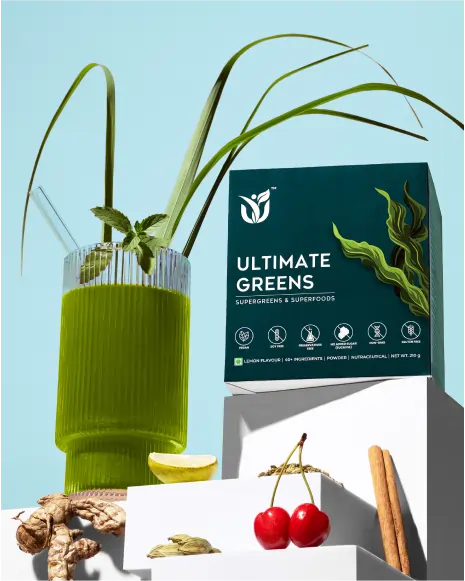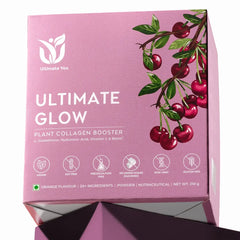Years of sun exposure can cause lasting skin damage. Glutathione supplementation could assist in restoring skin resilience and improving your overall skin tone.
Sun exposure is a double-edged sword. While it provides essential Vitamin D, prolonged and unprotected exposure can damage your skin—leading to pigmentation, premature aging, and a host of other issues. In the quest for effective skin repair, one name constantly pops up: Glutathione.
Often dubbed the "master antioxidant," glutathione is gaining popularity in the skincare world for its potential to lighten skin, fade pigmentation, and possibly reverse UV damage. But how true are these claims?
Let’s dive into the science behind glutathione and whether it can actually help repair sun-damaged skin.
What Is Sun-Damaged Skin?
Before we explore the role of glutathione, it’s crucial to understand what sun damage really is.
Common Signs of Sun Damage:
- Hyperpigmentation (dark spots)
- Uneven skin tone
- Fine lines and wrinkles
- Loss of skin elasticity
- Rough or dry patches
- Redness and inflammation
This damage is caused by ultraviolet (UV) radiation, which penetrates the skin and generates free radicals. These unstable molecules can damage DNA, collagen, and skin cells—leading to visible aging and sometimes even skin cancer.
Glutathione: The Master Antioxidant
Glutathione is a tripeptide composed of three amino acids—glutamine, glycine, and cysteine. It’s produced naturally in the body and found in every cell, playing a crucial role in detoxification and antioxidant defense.
Key Functions:
- Neutralizes free radicals
- Supports liver detoxification
- Regenerates other antioxidants like Vitamin C and E
- Enhances immune function
- Regulates melanin production in the skin
Its antioxidant properties have sparked interest in its role in skin repair, especially when it comes to sun damage.
How Sun Exposure Affects the Skin at a Cellular Level?
UV rays, especially UVA and UVB, trigger the formation of reactive oxygen species (ROS). These ROS:
- Break down collagen and elastin
- Damage DNA
- Trigger melanin overproduction
- Cause inflammation
The result? Accelerated aging, uneven pigmentation, and a rough skin texture.
Glutathione, being an intracellular antioxidant, works inside the cells to neutralize these ROS before they can wreak havoc.
How Glutathione Helps Repair Sun-Damaged Skin
1. Reduces Oxidative Stress
Sun damage is primarily caused by oxidative stress. Glutathione directly scavenges free radicals, reducing inflammation and cellular damage caused by UV radiation.
2. Lightens Pigmentation
Glutathione inhibits tyrosinase, an enzyme involved in melanin production. This not only helps fade sunspots but also prevents new pigmentation from forming. It converts eumelanin (dark pigment) to pheomelanin (lighter pigment), resulting in a brighter, more even skin tone.
3. Supports Collagen Health
By reducing oxidative stress, glutathione indirectly protects collagen and elastin—the proteins responsible for skin firmness and elasticity.
4. Detoxifies Skin from the Inside Out
Through its action in the liver, glutathione aids in the removal of toxins and pollutants that can further compromise skin health, especially when combined with sun damage.
5. Boosts Cellular Repair
Glutathione plays a role in DNA synthesis and repair, which is crucial when skin cells are damaged by UV radiation.
Forms of Glutathione for Skin Repair
Glutathione can be taken or used in various ways, each with varying levels of effectiveness:
1. Oral Supplements
Glutathione is widely used and generally considered safe, especially when taken consistently at doses of 500–1000 mg per day; however, its absorption can vary depending on individual gut health.
If you are a fan of supplements and want to start using them for skin health, shop for ULTIMATE GLOW. It is a plant collagen booster that is enriched with vitamin C, biotin, hyaluronic acid, and more. It is completely free from added sugars, preservatives, and gluten. All you have to do is take 1 sachet a day pre/post meals for glowing skin.
Remember, consistency is key! Results may not appear overnight, but with daily use, you’re supporting your skin at the cellular level.
2. Intravenous (IV) Glutathione
Intravenous glutathione delivers the antioxidant directly into the bloodstream, offering higher bioavailability and is often used in dermatology clinics for skin brightening treatments.
3. Topical Glutathione
Topical glutathione has limited absorption due to the large size of its molecule, which is why it’s often combined with ingredients like Vitamin C or niacinamide to enhance penetration and effectiveness.
4. Liposomal Glutathione
Liposomal glutathione, which is encapsulated in fat molecules for improved absorption, is becoming increasingly popular as a supplement due to its enhanced bioavailability.
Natural Ways to Boost Glutathione
You can also support your body’s natural production of glutathione through:
Diet:
1. Sulfur-rich foods: Help flush out toxins and support enzyme function for clearer, balanced skin.
2. Whey protein: A powerful source, whey protein, fuels skin cell repair and improves texture through essential amino acids.
3. Selenium-rich foods: Defend against UV damage and reduce inflammation linked to premature aging.
4. Vitamin C: Brightens skin tone and helps fade dark spots by supporting collagen and repair.
Apart from these you can start eating other glutathione-rich foods to fight oxidative stress and promote collagen production. By enhancing your body’s natural detox pathways, glutathione helps maintain a clear, even skin tone and reduces dullness caused by environmental stressors.
Lifestyle
1. Regular exercise: Helps your body get rid of waste, which can keep your skin clear and fresh.
2. Quality sleep: Gives your skin time to heal and wake up looking more rested and glowing.
3. Avoiding alcohol and smoking: Keeps your skin firm and smooth by protecting it from early wrinkles.
4. Managing stress: Keeps skin calm by avoiding breakouts, oiliness, and redness caused by stress.
Does Glutathione Work for All Skin Types?
While many people have reported positive effects, responses can vary based on:
- Genetics
- Dosage and duration
- Method of administration
- Baseline glutathione levels
- Type and severity of sun damage
People with darker skin tones often see more noticeable changes in pigmentation, while others may experience improved texture and radiance rather than visible lightening.
Are There Any Side Effects?
Glutathione is generally safe when taken appropriately. However, potential side effects may include:
- Mild digestive discomfort
- Skin rashes (rare)
- Allergic reactions (especially with IV forms)
- Zinc depletion (with long-term use)
Always consult a healthcare provider before starting glutathione, especially if you’re pregnant, breastfeeding, or on medications.
Can Glutathione Reverse Years of Sun Damage?
Here’s the truth: Glutathione is not a miracle cure. It won’t erase all signs of sun damage overnight.
However, as a supportive therapy, glutathione can:
- Brighten hyperpigmentation
- Improve skin tone and clarity
- Support collagen and cellular repair
- Enhance the results of other skincare treatments
When used alongside sunscreen, a healthy lifestyle, and a targeted skincare routine, glutathione can be a valuable ally in your skin healing journey.
Complementary Ingredients That Work Well With Glutathione
Pairing glutathione with other skin-supportive nutrients can amplify its benefits:
1. Vitamin C
Vitamin C helps regenerate glutathione in the body while also brightening the skin and protecting it from further UV-induced damage.
2. Alpha Lipoic Acid
Works synergistically with glutathione, alpha lipoic acid enhancing its effects as a potent antioxidant while offering additional anti-aging benefits for overall skin and cellular health.
3. N-Acetyl Cysteine (NAC)
N-acetylcysteine (NAC) acts as a precursor to glutathione, supplying the body with the building blocks it needs to naturally boost its own glutathione production.
4. CoQ10
Coenzyme Q10 supports cellular energy production and strengthens the body’s antioxidant defenses, making it a valuable nutrient for overall vitality and skin health.
5. Niacinamide
Omega-3 fatty acids help reduce inflammation in the body and contribute to improved skin texture, promoting a smoother, healthier complexion.
Realistic Expectations: What Results Can You Expect?
After 4–6 Weeks: Brighter skin with reduced dullness and slight fading of pigmentation.
After 2–3 Months: Noticeable improvement in skin tone, smoother texture, reduced dark spots and sun patches.
After 6 Months or More: Improved skin elasticity, repair of mild sun damage, glowing and healthier skin.
Who Should Consider Glutathione for Skin?
Glutathione may be worth trying if you:
- Have visible sunspots or discoloration
- Want a non-invasive option to even skin tone
- Are dealing with oxidative stress or a dull complexion
- Want to support your skin from the inside out
However, it may not be the best solution for:
- Deep wrinkles or severe UV damage (consult a dermatologist)
- Those looking for immediate results
- People with glutathione metabolism disorders
Final Thoughts
Glutathione isn’t just a beauty trend—it’s a scientifically-backed compound that helps the body and skin fight oxidative damage. While it won’t completely erase years of sun exposure, it offers a meaningful way to restore, revive, and brighten skin naturally.
If your skin has faced the harshness of the sun, think of glutathione not as a quick fix—but as a reliable companion in your skin-healing journey.
Do you have any questions? You can drop them in the comments. Our team of healthcare professionals will answer them as soon as possible.
Disclaimer
The information provided is for educational purposes only and is not intended to be a substitute for medical treatment. If you're pregnant, nursing, taking medication, or have a medical condition, it's better to consult a healthcare professional. Ultimate You does not provide any guarantee regarding the accuracy, adequacy, completeness, legality, reliability, or usefulness of the information and disclaims any liability arising from it.

Ram Charan
Content Lead
With over 7 years of experience, he crafts engaging stories and compelling narratives. He believes crisp and engaging content adds value to customers and drives immense sales to businesses. When he's not working, you'll find him hanging out with friends, binge-watching movies, and exploring the world of organic foods.
- Choosing a selection results in a full page refresh.
- Opens in a new window.
15%

on your next order
By submitting your email address, you agree to receive marketing emails from Ultimate You at the email address provided. We may use information collected about you on our site to suggest the products and offers. you can withdraw your consent at any time by following the unsubscribe instructions in any email we send to you. view Terms and Privacy. Contact Ultimate Customer Care at #204-8430 Saint Monica Building, near Char Miner, Hyderabad, India, 203455.








